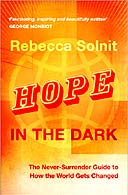
Hope in the Dark
by Rebecca Solnit
Canongate £7.99, pp192
Doom comes cheap on the protest front. The end of the G8 world is always nigh as ice caps melt, Africa starves and Sellafield shuts down again. Oh woe! Oodles of woe! But why, pray, be so damned gloomy all the time? What price 'the grumpiness of perfectionists who hold that anything less than total victory is failure? This is Earth. It will never be Heaven.'
Thank you and good night, Ralph Nader, plus sundry other 'old figureheads' of radical action. Whatever became of your 'capacity for joy and carnival'? Why try to build an earthly paradise when that, by definition, is 'a static place - where change is no longer necessary'?
Living in paradise 'does not require courage, selflessness, creativity, passion'. Paradise is a sedative, a sanctuary without a soul. And Rebecca Solnit, the soul of once and continuing San Francisco, believes in taking no sleeping tablets, in forever travelling hopefully. It's being so cheerful that keeps her (and us) going.
The point is crucially made. Fear may, in the end, move governments to compromise on everything from ID cards to budget rebates, but hope moves mountains. The orange revolutionaries who camped out in Kiev last winter and changed an election result, a presidency and their country were hoping for something better, just like the crowds who tore down the Berlin Wall in 1989.
The South African foes who came together to find truth and reconciliation in discussion hoped passionately, against all the odds, to escape their pasts. Don't you see that hope is the tiger in people power's tank?
So, with a beguiling grin, Solnit moves to Seattle in 1999 and Gleneagles in 2005. Every 'world leader' heading for Scotland this week and wanting to understand the ruckus that awaits them should read this book. It is the beginning of understanding, as long as he or she also understands that final chapters are never written.
Do those guys out there waving their placards belong to just another political force pulling ordinary political levers? No; this force 'is generously, joyously impure, with the impurity that comes from mixing and circulating and stirring things up'. This force is infinitely diffuse, a milling throng of attitudes spread across the worldwide web and not an agenda.
You can't, if you're an elected suit, give the protesters what they want because after they get what they want, they won't settle for what they wanted at all. One debt write-off or Geldof concert won't do the trick. There's no single fix, quick or otherwise. But always remember: the force is with them. They get off their butts in a sedentary age. They can save the brown pelican or the elephant seal. They can rescue such native American Indian tribes as the Coast Miwok from extinction. They can yoke 20 weak nations together at Cancun and see them stand up to the strong. They mutate across generations. That's hope for you. It is the true force of change.
The thesis comes in 21 brief, crafted essays. It is in no sense a heavy read. Solnit knows her cultural history, art and literature as well as she knows the rowdy streets of Seattle at World Trade meeting time, but her most dazzling gift is a prose style that is precise, pungent but also near-poetic. She can make you believe, and, for much of the time, you do believe.
Is that always quite enough? There are, on inspection, some holes around as big as the one in the ozone layer. Was India's last election decision 'to kick out the BJP, with its strange mix of Hindu racism and cultic neoliberalism', a triumph for Hope Incorporated? Not unless you like your facts and credulity curried in ignorance. Was 'the extraordinary peace activism' over Iraq 2003, the march of the millions, really such a triumph? Two years later, Messrs Bush and Blair are duly re-elected, the valiant defiance of Schröder and Chirac is down the tubes and the young men bent on car-bomb self-immolation around Baghdad are hardly Solnit's most hopeful candidates in waiting.
There is a danger of over-claiming, of turning all grist to this convenient mill, and she doesn't altogether avoid it. Nor are all the positives that flow from her heroes of victorious rebellion utterly convincing. She is, for instance, much in thrall to the Zapatistas of Chiapas province and Subcomandante Marcos, who sounds like a Solnit chapter when he speaks. ('History written by power told us that we had lost, but we skipped class when they taught conformity and idiocy. We failed modernity').
Yet after 10 years of ferment, have the Zapatistas fundamentally changed Mexico and Nafta and relations with Texas's favourite son? Perhaps, but only perhaps. Maybe Bolivia has picked up their tune at last. Maybe the roots of revolt are spreading. But proof still drags along in the wake of fervent assertion. The temptation to build too great an edifice on too fragile foundations seems omnipresent.
But maybe, too, such carping misses Rebecca Solnit's central point. She's a thinker and inspirer, not a recruiting sergeant. Since she has no dogma to peddle, she can never be boringly dogmatic. Her Hope is a sound and light show, a call to arms, but also a charmingly disarming conversation piece. If you're interested in where democracy - and thus the democratic world - goes next, she's an essential time-travelling companion.
Don't look round, though, and expect her to issue orders or dish out pat solutions. She's Dr Who and Dr Why, not Dr How. She's the enduring spirit of old San Francisco. Save a world worth saving and smile as you do it. Happy hoping.

